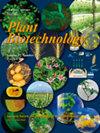细菌胆碱氧化酶a基因通过HSP终止子转录增强,提高了桉树甘氨酸甜菜碱产量和耐盐性。
IF 1.4
4区 生物学
Q4 BIOTECHNOLOGY & APPLIED MICROBIOLOGY
引用次数: 8
摘要
利用花椰菜花叶病毒(CaMV) 35S启动子和拟南芥热休克蛋白(HSP)终止子,构建了表达细菌胆碱氧化酶A (codA)基因的转基因桉树。为了评估转基因树的codA转录水平、代谢产物和非生物胁迫耐受性,在中等强度盐胁迫条件下进行了为期6个月的半密闭网房栽培试验。CaMV 35S启动子驱动的codA转录水平高出4倍以上,codA代谢产物甘氨酸甜菜碱含量高出2倍,HSP终止子比NOS终止子高2倍。此外,筛房栽培表明,盐胁迫条件下转基因树的生长与甘氨酸甜菜碱浓度相关。这些结果表明,HSP终止子对codA转录的增强增强了桉树人工林对非生物胁迫的耐受性。本文章由计算机程序翻译,如有差异,请以英文原文为准。
Transcriptional enhancement of a bacterial choline oxidase A gene by an HSP terminator improves the glycine betaine production and salinity stress tolerance of Eucalyptus camaldulensis trees.
Novel transgenic Eucalyptus camaldulensis trees expressing the bacterial choline oxidase A (codA) gene by the Cauliflower mosaic virus (CaMV) 35S promoter and the Arabidopsis thaliana heat shock protein (HSP) terminator was developed. To evaluate the codA transcription level and the metabolic products and abiotic stress tolerance of the transgenic trees, a six-month semi-confined screen house cultivation trial was conducted under a moderate-stringency salt-stress condition. The transcription level of the CaMV 35S promoter driven-codA was more than fourfold higher, and the content of glycine betaine, the metabolic product of codA, was twofold higher, with the HSP terminator than with the nopaline synthase (NOS) terminator. Moreover, the screen house cultivation revealed that the growth of transgenic trees under the salt stress condition was alleviated in correlation with the glycine betaine concentration. These results suggest that the enhancement of codA transcription by the HSP terminator increased the abiotic stress tolerance of Eucalyptus plantation trees.
求助全文
通过发布文献求助,成功后即可免费获取论文全文。
去求助
来源期刊

Plant Biotechnology
BIOTECHNOLOGY & APPLIED MICROBIOLOGY-PLANT SCIENCES
CiteScore
2.90
自引率
18.80%
发文量
45
审稿时长
6-12 weeks
期刊介绍:
Plant Biotechnology is an international, open-access, and online journal, published every three months by the Japanese Society for Plant Biotechnology. The journal, first published in 1984 as the predecessor journal, “Plant Tissue Culture Letters” and became its present form in 1997 when the society name was renamed to Japanese Society for Plant Cell and Molecular Biology, publishes findings in the areas from basic- to application research of plant biotechnology. The aim of Plant Biotechnology is to publish original and high-impact papers, in the most rapid turnaround time for reviewing, on the plant biotechnology including tissue culture, production of specialized metabolites, transgenic technology, and genome editing technology, and also on the related research fields including molecular biology, cell biology, genetics, plant breeding, plant physiology and biochemistry, metabolic engineering, synthetic biology, and bioinformatics.
 求助内容:
求助内容: 应助结果提醒方式:
应助结果提醒方式:


